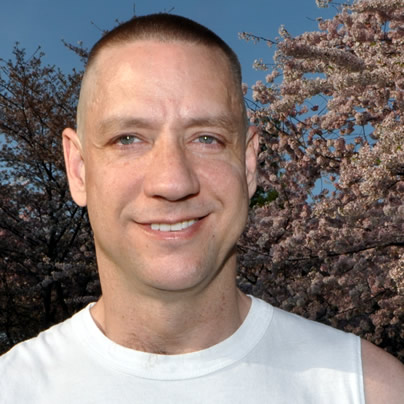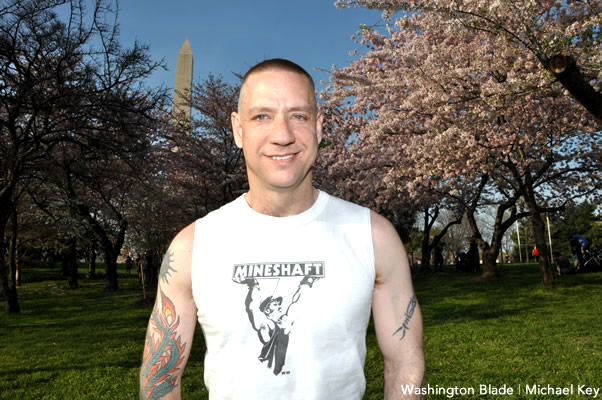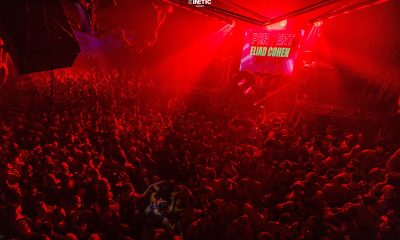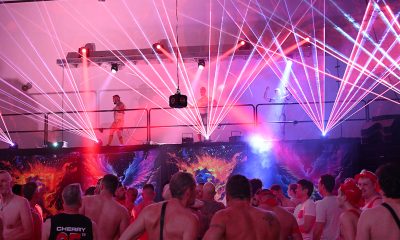Arts & Entertainment
Queery: David Merrill
The Cherry DJ answers 20 gay questions

When asked why he gave up a 15-year computer science career to become a full-time DJ, Columbia Heights resident David Merrill has a simple answer: “Because I could.”
Merrill started spinning in college but soon his day job took over.
“When you’re working 60 to 70 hours a week, which is normal for that field, you don’t have the energy to be out spinning ‘til 4 in the morning,” he says. “I always wanted to do it and I was just finally at a point where I could.”
Listen for Merrill tonight at the “Boys on Fire” party from 9 p.m. to 3 a.m. at the Warehouse Loft (411 New York Ave., N.E.) where he’ll open for DJ Paulo. Though he’s attended Cherry each year for about 10 years, this is Merrill’s first time spinning and only his second circuit party. He also has monthly gigs at Code (first Saturday of each month at Green Lantern), Triple X (every third Friday at the Crucible) and a radio show called Club Queer. On Saturday night, he’ll be at Cobalt’s Raw event.
“I have very eclectic tastes,” he says. “The only hard-and-fast rule is if it makes me want to shake my ass, I’ll play it.”
He says tonight’s set will have elements of tribal, progressive and “acid house” grooves. He’ll spin about three hours. Go to cherryfund.org for details on all Cherry events. See page 33 for more information.
“Cherry is all about the music, all about the dancing,” he says. “You’re gonna see some amazing décor and there will be lots of hot guys half naked and that’s great, but like all great parties, it’s really about the music first and foremost. It’ll be some of the greatest music you ever hear in your life. DJ Paulo is amazing. It’s such an honor to open for him.”
Merrill grew up in Alexandria and has also lived in North Carolina and Florida at various times for school and career. He worked for years in Tampa doing computer work. He’s been back in Washington for about 10 years.
Though mum about his personal life, Merrill lives in Columbia Heights and enjoys dinner-and-a-movie evenings at home to relax. (Blade photos by Michael Key)
How long have you been out and who was the hardest person to tell?
I never really “came out” officially. My mother eavesdropped on a phone call from my boyfriend, who called on Christmas Eve to wish me a Merry Christmas, and she outed me to the rest of the family. My father threw me out of the house that very night. I was 15. Since I had nothing to lose, I have ever since then been completely out.
Who’s your LGBT hero?
I have so many, but I would have to say Harvey Milk really stands out. So much of what we have accomplished is due to his leadership and the influence that he, and his assassination, had on the gay rights movement.
What’s Washington’s best nightspot, past or present?
That’s a hard one, and I know I might offend some current club owners but I have to say Tracks. But the lousiest nightclub can be heaven if a great DJ is playing. I don’t need lights and fog and lasers. Sure, they’re cool, but it’s all about the music for me.
Describe your dream wedding.
All of my family and friends on the roof of the Hay-Adams Hotel, across the street from the White House.
What non-LGBT issue are you most passionate about?
I’m passionate about all civil rights issues. Every person deserves to be treated with dignity and respect no matter their gender, orientation, religion, race or any other characteristic they might have.
What historical outcome would you change?
I’m going to say the constitutional compromise that left slavery not only legal, but officially enshrined in our Constitution. Slavery is America’s “original sin” and I have to wonder what America would be like today if we had started out without that millstone around our neck.
What’s been the most memorable pop culture moment of your lifetime?
The first time I saw “Rocky Horror Picture Show.” I was about 12 or 13 years old so for me at that age it was incredibly subversive and I’ve loved subversive art and theater ever since.
On what do you insist?
I insist on always doing my absolute best. There will always be someone who can run faster, or make more money, or whatever, but as long as I always work hard and do my very best, I can look in the mirror and be proud of myself.
What was your last Facebook post or Tweet?
I posted a quote from Dan Savage: “Hostile parents can’t make their gay kids straight, but they can make them dead.”
If your life were a book, what would the title be?
“Wrong Turns That Turn Out Right”
If science discovered a way to change sexual orientation, what would you do?
Drop it in the Gatoraid at a nearby locker room? OK, I wouldn’t really do that, but it’s a nice fantasy. I sure wouldn’t take it myself. I am very happy with who I am, thank you very much.
What do you believe in beyond the physical world?
I don’t really know if there is a G-d in the Judeo-Christian sense, but I do believe that there is such a thing as sacred, and I try to find it in everyone.
What’s your advice for LGBT movement leaders?
I would just like to thank them for all the good work that they do, and encourage them to keep the faith, because our cause is just and we will prevail.
What would you walk across hot coals for?
I would do anything for my family.
What LGBT stereotype annoys you most?
I think the stereotype that we all cut hair or design interiors is ridiculous. Sure, lots of us are fabulous at those things, but lots more of us aren’t.
What’s your favorite LGBT movie?
“Angels in America.” I love the part where Hannah responds to Blanche DuBois — “I have always depended on the kindness of strangers”; “Well that’s a stupid thing to do.”
What’s the most overrated social custom?
Talking about the weather.
What trophy or prize do you most covet?
A great DJ can create a mood, really connect with a crowd of dancers, and take them on a musical and emotional journey. And when you’ve done that, when you have the crowd in the palm of your hand, you know it. You feel it. And THAT is the “prize” I work so hard to achieve. I live for that feeling. It’s why I’m a DJ.
What do you wish you’d known at 18?
At 18 I was on the street, off and on, living in empty lots. If I had known that things would eventually work out for me, it would have saved me so much fear and worry about the future. Life for me has just gotten better and better. At 18 the future looked really bleak.
Why Washington?
I love Washington! There are so many things to do, places to go, museums to visit and great restaurants. You could never do it all.
Books
Love or fear flying you’ll devour ‘Why Fly’
New book chronicles a lifetime obsession with aircraft

‘Why Fly’
By Caroline Paul
c. 2026, Bloomsbury
$27.99/256 pages
Tray table folded up.
Check. Your seat is in the upright position, the airflow above your head is just the way you like it, and you’re ready to go. The flight crew is making final preparations. The lights are off and the plane is backing up. All you need now is “Why Fly” by Caroline Paul, and buckle up.

When she was very young, Paul was “obsessed” with tales of adventure, devouring accounts written by men of their derring-do. The only female adventure-seeker she knew about then was Amelia Earhart; later, she learned of other adventuresome women, including aviatrix Bessie Coleman, and Paul was transfixed.
Time passed; Paul grew up to create a life of adventure all her own.
Then, the year her marriage started to fracture, she switched her obsession from general exploits to flight.
Specifically, Paul loves experimental aircraft, some of which, like her “trike,” can be made from a kit at home. Others, like Woodstock, her beloved yellow gyrocopter, are major purchases that operate under different FAA rules. All flying has rules, she says, even if it seems like it should be as freewheeling as the birds it mimics.
She loves the pre-flight checklist, which is pure anticipation as well as a series of safety measures; if only a relationship had the same ritual. Paul loves her hangar, as a place of comfort and for flight in all senses of the word. She enjoys thinking about historic tales of flying, going back before the Wright Brothers, and including a man who went aloft on a lawn chair via helium-filled weather balloons.
The mere idea that she can fly any time is like a gift to Paul.
She knows a lot of people are terrified of flying, but it’s near totally safe: generally, there’s a one in almost 14 million chance of perishing in a commercial airline disaster – although, to Paul’s embarrassment and her dismay, it’s possible that both the smallest planes and the grandest loves might crash.
If you’re a fan of flying, you know what to do here. If you fear it, pry your fingernails off the armrests, take a deep breath, and head to the shelves. “Why Fly” might help you change your mind.
It’s not just that author Caroline Paul enjoys being airborne, and she tells you. It’s not that she’s honest in her explanations of being in love and being aloft. It’s the meditative aura you’ll get as you’re reading this book that makes it so appealing, despite the sometimes technical information that may flummox you between the Zen-ness. It’s not overwhelming; it mixes well with the history Paul includes, biographies, the science, heartbreak, and exciting tales of adventure and risk, but it’s there. Readers and romantics who love the outdoors, can’t resist a good mountain, and crave activity won’t mind it, though, not at all.
If you own a plane – or want to – you’ll want this book, too. It’s a great waiting-at-the-airport tale, or a tuck-in-your-suitcase-for-later read. Find “Why Fly” and you’ll see that it’s an upright kind of book.
The Blade may receive commissions from qualifying purchases made via this post.
Theater
Out actor Kevin Cahoon on starring role in ‘Chez Joey’
Arena production adapted from Broadway classic ‘Pal Joey’

‘Chez Joey’
Through March 15
Arena Stage
1101 Sixth St., S.W.
Tickets start at $93
Arenastage.org
As Melvin Snyder in the new musical “Chez Joey,” out actor Kevin Cahoon plays a showbiz society columnist who goes by the name Mrs. Knickerbocker. He functions as a sort of liaison between café society and Chicago’s Black jazz scene circa 1940s. It’s a fun part replete with varied insights, music, and dance.
“Chez Joey” is adapted from the Broadway classic “Pal Joey” by Richard Rodgers and Lorenz Hart. It’s inspired by John O’Hara’s stories based on the exploits of a small-time nightclub singer published in The New Yorker.
A warm and humorous man, Cahoon loves his work. At just six, he began his career as a rodeo clown in Houston. He won the Star Search teen division at 13 singing songs like “Some People” from “Gypsy.” He studied theater at New York University and soon after graduating set to work playing sidekicks and comedic roles.
Over the years, Cahoon has played numerous queer parts in stage productions including “Hedwig and the Angry Inch,” “La Cage aux Folles,” “Rocky Horror” as well as Peanut in “Shucked,” and George the keyboardist in “The Wedding Singer,” “a sort of unicorn of its time,” says Cahoon.
Co-directed by Tony Goldwyn and the great Savion Glover, “Chez Joey” is a terrific and fun show filled with loads of talent. Its relevant new book is by Richard Lagravenese.
On a recent Monday off from work, Cahoon shared some thoughts on past and current happenings.
WASHINGTON BLADE: Is there a through line from Kevin, the six-year-old rodeo clown, to who we see now at Arena Stage?
KEVIN CAHOON: Anytime I want to land a joke in a theater piece it goes back to that rodeo clown. It doesn’t matter if it’s Arena’s intimate Kreeger Theatre or the big rodeo at the huge Houston Astrodome.
I was in the middle stadium and there was an announcer — a scene partner really. And we were doing a back and forth in hopes of getting laughs. At that young age I was trying to understand what it takes to get laughs. It’s all about timing. Every line.
BLADE: Originally, your part in “Chez Joey” Melvin was Melba who sings “Zip,” a clever woman reporter’s song. It was sort of a star feature, where they could just pop in a star in the run of “Pal Joey.”
CAHOON: That’s right. And in former versions it was played by Martha Plimpton and before her Elaine Stritch. For “Chez Joey,” we switched gender and storyline.
We attempted to do “Zip” up until two days before we had an audience at Arena. Unexpectedly they cut “Zip” and replaced it with a fun number called “I Like to Recognize the Tune,” a song more connected to the story.
BLADE: Wow. You must be a quick study.
CAHOON: Well, we’re working with a great band.
BLADE: You’ve played a lot of queer parts. Any thoughts on queer representation?
CAHOON: Oh yes, definitely. And I’ve been very lucky that I’ve had the chance to portray these characters and introduce them to the rest of the world. I feel honored.
After originating Edna, the hyena on Broadway in “The Lion King,” I left that to do “Hedwig and the Angry Inch” as standby for John Cameron Mitchell, doing one show a week for him.
Everyone thought I was crazy to leave the biggest musical of our time with a personal contract and getting paid more money that I’d ever made to get $400 a week at the downtown Jane Street Theatre in a dicey neighborhood.
At the time, I really felt like I was with cool kids. I guess I was. And I never regretted it.
BLADE: When you play new parts, do you create new backstories for the role?
CAHOON: Every single time! For Melvin, I suggested a line about chorus boys on Lakeshore Drive.
BLADE: What’s up next for Kevin Cahoon?
CAHOON: I’m about to do the New York Theatre Workshop Gala; I’ve been doing it for nine years in a row. It’s a huge job. I’ll also be producing the “Cats: The Jellicle Ball” opening on Broadway this spring; it’s a queer-centric uptown vogue ball with gay actor André de Shields reprising his role as “Old Deuteronomy.”
BLADE: There’s a huge amount of talent onstage in “Chez Joey.”
CAHOON: There is. I’m sharing a dressing room with Myles Frost who plays Joey. He won accolades for playing Michael Jackson on Broadway. We’ve become great friends. He’s a miracle to watch on stage. And Awa [Sal Secka], a D.C. local, is great. Every night the audience falls head over heels for her. When this show goes to New York, Awa will, no doubt, be a giant star.
BLADE: Do you think “Chez Joey” might be Broadway bound?
CAHOON: I have a good feeling it is. I’ve done shows out of town that have high hopes and pedigree, but don’t necessarily make it. “Chez Joey” is a small production, it’s funny, and audiences seem to love it.

The Capital Pride Alliance held the annual Pride Reveal event at The Schuyler at The Hamilton Hotel on Thursday, Feb. 26. The theme for this year’s Capital Pride was announced: “Exist. Resist. Have the audacity!”
(Washington Blade photos by Michael Key)























-

 India5 days ago
India5 days agoActivists push for better counting of transgender Indians in 2026 Census
-

 Advice5 days ago
Advice5 days agoDry January has isolated me from my friends
-

 District of Columbia5 days ago
District of Columbia5 days agoCapital Pride reveals 2026 theme
-

 National4 days ago
National4 days agoAfter layoffs at Advocate, parent company acquires ‘Them’ from Conde Nast





















